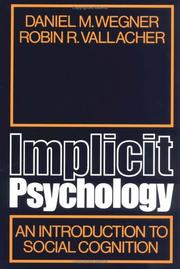| Listing 1 - 10 of 13 | << page >> |
Sort by
|
Book
ISBN: 3642426654 3642352790 3642352804 Year: 2013 Publisher: Berlin ; Heidelberg : Springer-Verlag,
Abstract | Keywords | Export | Availability | Bookmark
 Loading...
Loading...Choose an application
- Reference Manager
- EndNote
- RefWorks (Direct export to RefWorks)
Conflict is inherent in virtually every aspect of human relations, from sport to parliamentary democracy, from fashion in the arts to paradigmatic challenges in the sciences, and from economic activity to intimate relationships. Yet, it can become among the most serious social problems humans face when it loses its constructive features and becomes protracted over time with no obvious means of resolution. This book addresses the subject of intractable social conflict from a new vantage point. Here, these types of conflict represent self-organizing phenomena, emerging quite naturally from the ongoing dynamics in human interaction at any scale—from the interpersonal to the international. Using the universal language and computational framework of nonlinear dynamical systems theory in combination with recent insights from social psychology, intractable conflict is understood as a system locked in special attractor states that constrain the thoughts and actions of the parties to the conflict. The emergence and maintenance of attractors for conflict can be described by means of formal models that incorporate the results of computer simulations, experiments, field research, and archival analyses. Multi-disciplinary research reflecting these approaches provides encouraging support for the dynamical systems perspective. Importantly, this text presents new views on conflict resolution. In contrast to traditional approaches that tend to focus on basic, short-lived cause-effect relations, the dynamical perspective emphasizes the temporal patterns and potential for emergence in destructive relations. Attractor deconstruction entails restoring complexity to a conflict scenario by isolating elements or changing the feedback loops among them. The creation of a latent attractor trades on the tendency toward multi-stability in dynamical systems and entails the consolidation of incongruent (positive) elements into a coherent structure. In the bifurcation scenario, factors are identified that can change the number and types of attractors in a conflict scenario. The implementation of these strategies may hold the key to unlocking intractable conflict, creating the potential for constructive social relations. .
Conflict (Psychology). --- Social conflict. --- Socioeconomic factors. --- Sociology & Social History --- Social Sciences --- Social Change --- Social psychology. --- Mass psychology --- Psychology, Social --- Class conflict --- Class struggle --- Conflict, Social --- Social tensions --- Social sciences. --- Statistical physics. --- Dynamical systems. --- Complexity, Computational. --- Psychology. --- Social Sciences. --- Methodology of the Social Sciences. --- Complexity. --- Psychology, general. --- Statistical Physics, Dynamical Systems and Complexity. --- Behavioral sciences --- Mental philosophy --- Mind --- Science, Mental --- Human biology --- Philosophy --- Soul --- Mental health --- Complexity, Computational --- Electronic data processing --- Machine theory --- Dynamical systems --- Kinetics --- Mathematics --- Mechanics, Analytic --- Force and energy --- Mechanics --- Physics --- Statics --- Mathematical statistics --- Human sciences --- Sciences, Social --- Social science --- Social studies --- Civilization --- Statistical methods --- Human ecology --- Psychology --- Social groups --- Sociology --- Interpersonal conflict --- Social psychology --- Social sciences --- Engineering. --- Philosophy (General). --- Complex Systems. --- Statistical Physics and Dynamical Systems. --- Methodology. --- Construction --- Industrial arts --- Technology --- Computational complexity.

ISBN: 0127099905 9780127099903 Year: 1994 Publisher: San Diego (Calif.) Academic Press
Abstract | Keywords | Export | Availability | Bookmark
 Loading...
Loading...Choose an application
- Reference Manager
- EndNote
- RefWorks (Direct export to RefWorks)

ISBN: 1572303530 Year: 1998 Publisher: New York : Guilford Press,
Abstract | Keywords | Export | Availability | Bookmark
 Loading...
Loading...Choose an application
- Reference Manager
- EndNote
- RefWorks (Direct export to RefWorks)
Book
ISBN: 0898596173 9780898596175 Year: 1985 Publisher: Hillsdale Erlbaum
Abstract | Keywords | Export | Availability | Bookmark
 Loading...
Loading...Choose an application
- Reference Manager
- EndNote
- RefWorks (Direct export to RefWorks)
Intentionalism --- Act psychology --- Action psychology --- Psychology
Book
ISBN: 0195026489 0195026470 Year: 1980 Publisher: New York (N.Y.): Oxford university press
Abstract | Keywords | Export | Availability | Bookmark
 Loading...
Loading...Choose an application
- Reference Manager
- EndNote
- RefWorks (Direct export to RefWorks)
159.923.33 --- Sociale invloeden op het karakter. Sociale psychologie--(invloed van de omgeving op het individu;z.o.{316.6}) --- Social psychology. --- Self. --- 159.923.33 Sociale invloeden op het karakter. Sociale psychologie--(invloed van de omgeving op het individu;z.o.{316.6}) --- Self --- Social psychology --- Personal identity --- Consciousness --- Individuality --- Mind and body --- Personality --- Thought and thinking --- Will --- Mass psychology --- Psychology, Social --- Human ecology --- Psychology --- Social groups --- Sociology

ISBN: 0195022297 9780195022292 Year: 1979 Publisher: New York (N.Y.): Oxford university press
Abstract | Keywords | Export | Availability | Bookmark
 Loading...
Loading...Choose an application
- Reference Manager
- EndNote
- RefWorks (Direct export to RefWorks)
159.923.33*1 --- 159.923.33*1 Communicatie. Relatie --- Communicatie. Relatie --- Cognition --- Social perception --- Cognition, Social --- Interpersonal perception --- Social cognition --- Interpersonal relations --- Perception --- Social cognitive theory --- Psychology --- Cognition. --- Social perception.
Book
ISBN: 9781138951648 9781138951655 Year: 2017 Publisher: New York Routledge
Abstract | Keywords | Export | Availability | Bookmark
 Loading...
Loading...Choose an application
- Reference Manager
- EndNote
- RefWorks (Direct export to RefWorks)
Book
ISBN: 3030389871 3030389863 Year: 2020 Publisher: Cham : Springer International Publishing : Imprint: Springer,
Abstract | Keywords | Export | Availability | Bookmark
 Loading...
Loading...Choose an application
- Reference Manager
- EndNote
- RefWorks (Direct export to RefWorks)
This book introduces the reader to the concept of functional synchronization and how it operates on very different levels in psychological and social systems – from the emergence of thought to the formation of social relations and the structure of societies. For years, psychologists have investigated phenomena such as self-concept, social judgment, social relations, group dynamics, and cooperation and conflict, but have discussed these phenomena seoarately.This book shows how synchronization provides a foundational approach to these otherwise distinct and diverse psychological processes.This work shows that there is a basic tendency with many processes to become coordinated and progressively integrated into increasingly larger units through well-defined processes. For these larger units, new and largely adaptive functions emerge. Although synchronization affords progressive integration of system elements to enable correspondingly higher-order functions, the trajectory of synchronization is often characterized by periods of assembly and disassembly of system elements. This occurs when a task is completed and synchronization is no longer essential so that the elements once again operate in an independent fashion. It is argued that the disassembly-resynchronization scenario occurs at all levels of psychological and social reality. The implications of this approach for important issues in interpersonal relations and societal processes are discussed.
Social groups --- Psychological aspects. --- Social sciences. --- Cognitive psychology. --- Computational complexity. --- Social sciences—Philosophy. --- Methodology of the Social Sciences. --- Cognitive Psychology. --- Complexity. --- Social Theory. --- Complexity, Computational --- Electronic data processing --- Machine theory --- Psychology, Cognitive --- Cognitive science --- Psychology --- Behavioral sciences --- Human sciences --- Sciences, Social --- Social science --- Social studies --- Civilization
Book

ISBN: 9783030389871 Year: 2020 Publisher: Cham Springer International Publishing :Imprint: Springer
Abstract | Keywords | Export | Availability | Bookmark
 Loading...
Loading...Choose an application
- Reference Manager
- EndNote
- RefWorks (Direct export to RefWorks)
Political philosophy. Social philosophy --- Cognitive psychology --- Social sciences (general) --- Computer. Automation --- complexiteit --- sociale filosofie --- sociale wetenschappen --- cognitieve psychologie
Multi

ISBN: 9783030389871 Year: 2020 Publisher: Cham Springer International Publishing :Imprint: Springer
Abstract | Keywords | Export | Availability | Bookmark
 Loading...
Loading...Choose an application
- Reference Manager
- EndNote
- RefWorks (Direct export to RefWorks)
This book introduces the reader to the concept of functional synchronization and how it operates on very different levels in psychological and social systems – from the emergence of thought to the formation of social relations and the structure of societies. For years, psychologists have investigated phenomena such as self-concept, social judgment, social relations, group dynamics, and cooperation and conflict, but have discussed these phenomena seoarately.This book shows how synchronization provides a foundational approach to these otherwise distinct and diverse psychological processes.This work shows that there is a basic tendency with many processes to become coordinated and progressively integrated into increasingly larger units through well-defined processes. For these larger units, new and largely adaptive functions emerge. Although synchronization affords progressive integration of system elements to enable correspondingly higher-order functions, the trajectory of synchronization is often characterized by periods of assembly and disassembly of system elements. This occurs when a task is completed and synchronization is no longer essential so that the elements once again operate in an independent fashion. It is argued that the disassembly-resynchronization scenario occurs at all levels of psychological and social reality. The implications of this approach for important issues in interpersonal relations and societal processes are discussed.
Political philosophy. Social philosophy --- Cognitive psychology --- Social sciences (general) --- Computer. Automation --- complexiteit --- sociale filosofie --- sociale wetenschappen --- cognitieve psychologie
| Listing 1 - 10 of 13 | << page >> |
Sort by
|

 Search
Search Feedback
Feedback About UniCat
About UniCat  Help
Help News
News